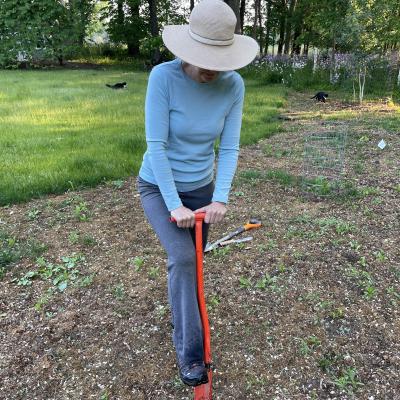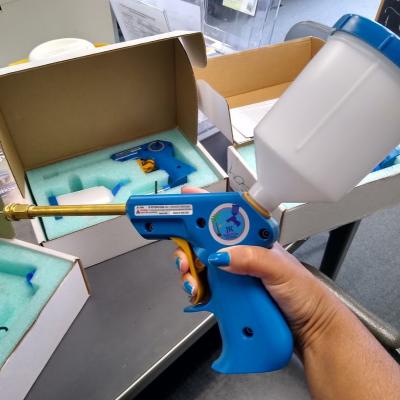Invasive Species
Awareness, Identification, Prevention, and Control

An invasive species is one that is not native and whose introduction causes harm, or is likely to cause harm to Michigan’s economy, environment, or human health.

Common Reed aka "Phragmites" (Phragmites australis)
Many non-native or introduced species, such as fruits, vegetables, field crops, livestock, and domestic animals, are beneficial to our economy or lifestyle. However, non-native species that cause negative ecological, economic, social or public health impacts are categorized as invasive. Once established, invasive species often out-compete native species for limited resources such as food, light, or water; alter and damage existing habitat; displace native species; and in some cases prey directly upon native species. Their impacts are found in our waterways, along our roadsides, in our wilderness areas and in both rural and urban communities.
Invasive species are typically extremely difficult to eradicate, so prevention is key!
An invasive species can take over a native habitat and push out existing species. For example, phragmites can colonize a wetland area and choke out every other species to create a monoculture, reducing the diversity of food and shelter available for native wildlife. Phragmites has also been found to alter the hydrology of a site, leading to drier soils altering the landscape and the ecosystem services.
Each invasive species requires a different approach. Significant damage can be done by using the wrong removal method. For example, cutting or mowing spurs additional growth in Japanese knotweed. Knotweed must be injected with herbicide during flowering period between August-September.
Read on to learn about different resources, tools, and service providers available for identifying, preventing, and controlling invasive species.
Invasive Species Tools
The WCCD Tool Lending Library offers tool loans for mechanical (pulling tools) and chemical (herbicide application tools) management of Invasive species.
Regional Partner: JLW CISMA
In order to address invasive species across in the region, a collaborative group of stakeholders from the Jackson, Lenawee and Washtenaw Counties applied for, and received a grant to establish the "Jackson, Lenawee and Washtenaw Cooperative Invasive Species Management Areas (JLW CISMA)".
The JLW CISMA has the mission to prevent, detect, eradicate and control invasive species in the area, create a strategic plan for reducing the threat of invasive species and to provide outreach and educational opportunities for local citizens and stakeholder groups . Currently, the JLW CISMA is focusing their efforts on education and outreach. The organization coordinates and supports partner efforts to survey and develop early detection, response and a strategic eradication plan.
If you have any questions or would like more information, please contact the JLW CISMA coordinator:
Dr. Shikha Singh, 517-395-2089, shikha.singh@macd.org
Priority Species
As part of our efforts in the JLW CISMA, we are working to identify invasive species of concern in our county. If you have identified a species of concern, please contact the JLW CISMA or fill out a report directly to the State of Michigan here.
Report Invasive Species
The Midwest Invasive Species Information Network (MISIN) is a regional effort to develop and provide early detection and response resources for invasive species.
Invasive species resources:
- Michigan Invasive Species (State Website)
- Invasive Species Watchlist: Species either have never been confirmed in the wild in Michigan or have a limited known distribution. If you see a species on the watch list, please report the occurrence!
- Prohibited and Restricted Species: Learn which species are legally prohibited under Michigan law.
- NotMiSpecies Webinar Series: Register to attend webinars or watch recordings covering invasive species identification, prevention, and control.
- Midwest Invasive Species Information Network (MISIN) (Regional) - Note some features below require creating an account
- Species Information Sheets
- Report Invasive Species
- Training Modules - learn how to a identify a specific species in the field
- Michigan Specific Invasive Species Info
- National Invasive Species Information Center
- Jackson, Lenawee and Washtenaw Cooperative Invasive Species Management Areas (JLW CISMA) (Local/Tri-County)
- The Woody Invasives of the Great Lakes Collaborative has useful management resources for many species with Decision Trees for prioritizing management of invasives.
Species Specific Information:
- Autumn Olive (Elaeagnus umbellata)
- Common Buckthorn (Rhamnus cathartica)
- Common reed / Phragmities (Phragmites australis)
- Great Lakes Phragmites Collaborative (Regional/Great Lakes) - Learn to identify common reed/phragmites, track and map it, ask questions of experts and professionals, and learn about best management practices for removal and post-treatment restoration.
- Japanese knotweed (Reynoutria japonica)
- Japanese stiltgrass (Microstegium vimineum)
- Oak wilt, caused by a fungus: (Bretziella fagacearum)
- Spongy moth, formerly Gypsy Moth, (Lymantria dispar)


